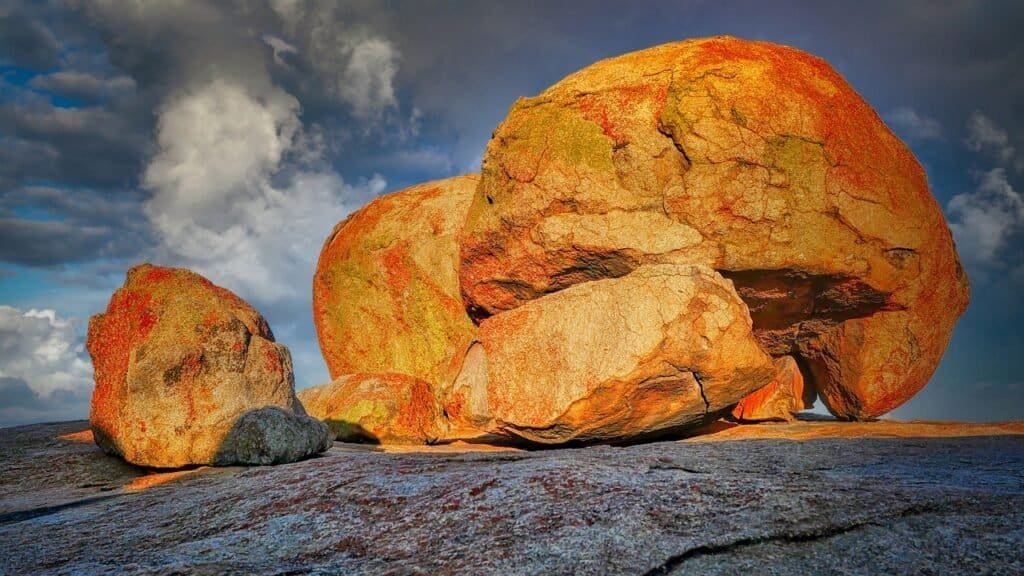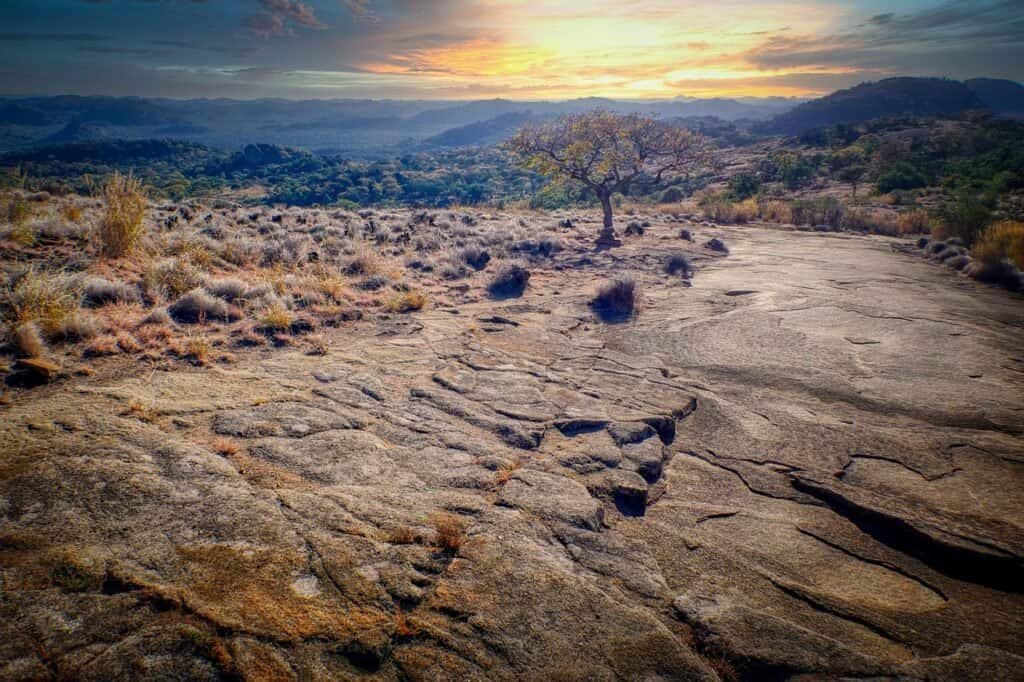Are you thinking about visiting the Matobo Hills in Zimbabwe? Here, beautiful landscapes meet a deep history. Giant rocks and ancient sites blend into one stunning view.
This guide will help you get the most out of your visit, from walking through the unique rock formations to exploring the local wildlife and learning about the area’s rich past. The Matobo Hills are not just a scenic spot; they are a peek into the heart of Zimbabwe’s heritage. Whether you’re into the great outdoors, fascinated by history, or just looking for a new adventure, there’s something here for everyone.
Let’s dive into what makes the Matobo Hills a must-see.
The Unique Landscape Of The Matobo Hills
The Matobo Hills stand out with their incredible granite rock formations called kopjes. These large rocks have been shaped over millions of years by erosion, creating unusual shapes and formations where some boulders seem to balance precariously on top of one another. It’s a fascinating sight that draws visitors from all over.
Beyond just rocks, the Matobo Hills are a thriving hub of biodiversity. The area is home to a wide variety of plants and animals, including the rare and endangered black and white rhinoceros. This makes the hills not only a place of great natural beauty but also an important area for wildlife conservation. Here, you can experience the rich tapestry of nature and history intertwined, making it a vital and vibrant part of Zimbabwe’s heritage.

The Rich History Of The Matobo Hills
Here’s a round up of the different historic sights you can see when visiting Matobo Hills.
Rock Art Sites
The Matobo Hills are renowned for their extensive collection of ancient rock art, with over 3,000 documented sites. These artworks, crafted by the San people, span at least 13,000 years and showcase a range of scenes from daily life to spiritual rituals, featuring animals, human figures, and abstract patterns. The art offers a glimpse into the rich cultural and spiritual lives of these ancient communities.
Among these, Nswatugi Cave is a highlight where visitors can admire a wide array of animal paintings, including giraffes, elephants, and kudu, all vividly preserved over millennia. Bambata Cave is another notable site, famous for its dynamic frieze that includes images of sable antelope and eland alongside depictions of human figures, illustrating the interaction between humans and their environment. For those up for an adventure, a hike to Inanke Cave rewards with some of the most detailed and well-preserved paintings in the area, featuring an evocative scene of women dancing, which speaks volumes about the social practices of the time.
These sites enrich our understanding of prehistoric life and underscore the Matobo Hills as a crucial site for cultural preservation and study, bridging past and present through the enduring legacy of rock art.

Historical Sites
Beyond ancient rock art, the Matobo Hills are steeped in more modern historical significance. In the late 19th century, this area was a key battleground in the conflicts between the Ndebele people and European settlers.
A notable historical landmark here is the grave of Cecil John Rhodes, the British colonialist who played a major role in the region’s history. Rhodes was buried at World’s View, a stunning lookout point that offers panoramic views of the hills and valleys below. Today, visitors can visit his grave and enjoy the spectacular scenery that stretches out from this unique spot.
Another important site is the Njelele Shrine, a sacred spot for the Ndebele people. It serves as a cultural and spiritual hub, primarily used for rainmaking ceremonies and traditional rituals. While it is not accessible to tourists, the shrine’s ongoing role in local cultural practices highlights the deep spiritual and historical layers that enrich the Matobo Hills.
Experiencing The Culture Of The Matobo Hills
Experience the different cultural elements at Matobo Hills.
Village Visits And Cultural Experiences
A great way to truly experience the culture of the Matobo Hills is by visiting a local village. Many tour companies organize guided trips to these villages, where you can see firsthand how the local people live, and learn about their customs and traditions.
During these visits, you’ll have the chance to taste traditional dishes, join in local dances, and even try your hand at crafts like pottery and basket weaving. These activities not only provide fun learning experiences but also offer a deeper insight into the rich cultural heritage that has defined the Matobo Hills for generations. Engaging with the community in this way allows visitors to connect more meaningfully with the area and its people.
Traditional Music And Dance Performances
Music and dance are at the heart of life in the Matobo Hills, and seeing a live show is a wonderful way to dive into the local culture. Many lodges and tour groups arrange cultural nights where you can watch performances by talented local artists.
These events highlight the special sounds and rhythms of the area and show off the performers’ incredible talents. Watching and perhaps even participating in these dances and songs offers a fun and unforgettable way to understand and appreciate the vibrant cultural traditions of the Matobo Hills.
The Amagugu International Heritage Centre
For travelers keen to delve deeper into the history and culture of the Matobo Hills and Zimbabwe, a trip to the Amagugu International Heritage Centre is essential. This cultural hub is dedicated to preserving and showcasing the region’s heritage through educational programs, exhibitions, and a range of interactive events.
At the centre, visitors can browse engaging exhibits that bring the local history and traditions to life. They also have the opportunity to participate in workshops where they can learn traditional crafts directly from skilled artisans. Additionally, the centre offers guided tours that explore the rich cultural and historical landscape of the area, providing insights not only into the past but also into how these traditions continue to influence the present. This visit is informative and a chance to actively support cultural preservation efforts in Zimbabwe.
How to Visit Matobo Hills
The Matobo Hills are not just a cultural treasure; they’re also a haven for wildlife enthusiasts. The Matobo National Park, which covers a large part of the hills, is a fantastic place to see diverse animal species. It’s home to endangered black and white rhinos, leopards, klipspringers, numerous bird species, and even boasts the world’s highest concentration of black eagles—a real treat for birdwatchers.
Visitors can join guided game drives or walking safaris to get a close look at the unique flora and fauna of the area. The park’s guides are experts in the local ecosystems and provide insightful commentary that enhances the experience, offering a deeper appreciation of the Matobo Hills’ incredible biodiversity.
The Matobo Hills offer a rich mix of cultural, historical, and natural attractions. From exploring ancient rock art sites and significant historical landmarks to enjoying lively traditional music and dance performances, a visit here is a journey into the vibrant heart of Zimbabwe’s heritage. With its breathtaking landscapes and unique wildlife, the Matobo Hills are indeed one of Zimbabwe’s hidden gems.
For those eager to explore the Matobo Hills, consider this sample itinerary or contact us to customize your adventure in Zimbabwe exactly as you wish. To help plan your trip, get in touch with Andy from The Grown-Up Travel Company to help plan your trip, get in touch directly below:







:max_bytes(150000):strip_icc()/january-amazon-outlet-sneaker-deals-tout-a9c4f079568445cc95abe93a012c68be.jpg?w=145&resize=145,100&ssl=1)
Leave a Comment